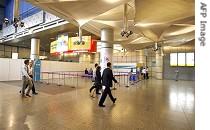2006年VOA标准英语-Singapore's Restrictions on Activists During Wo(在线收听)
By Ron Corben
Bangkok
13 September 2006
Singapore's restrictions on protests by civic groups at the annual meeting of the World Bank and International Monetary Fund next week have drawn criticism from Bank officials, as well as from activist groups.
-----
Singapore's tough public security guidelines have come under the spotlight ahead of next week's annual meeting of the World Bank and International Monetary Fund.
 People walk past designated space for protesters at Suntec City Convention center, Wednesday |
||
Those on the banned list include representatives from the World Development Movement in Britain, Thailand's Focus on the Global South, the Freedom from Debt Coalition in the Philippines and the Forum on Indonesian Development.
Singapore authorities say the tough policy will prevent violent anti-globalization protests that those that brought the World Trade Organization meeting in Seattle in 1999 to a standstill.
The government is allowing about 700 activists from more than 70 organizations worldwide to gather at a specially designated zone in the convention center where the meeting will take place.
Roderick Chia, with the Asian Forum for Human Rights and Development, says authorities have set down clear limits for civic groups.
"No gatherings are allowed outside Suntec City itself, according to Singapore law, more specific guidelines issued by the police, civil society organizations must not move out of the designated area, are not allowed to use sound and amplification systems, or burn items or behave in a manner that would 'provoke a breach of peace'," he said.
The restrictions have drawn criticism not only from activist groups, but also from the World Bank president, Paul Wolfowitz. He has urged Singaporean authorities to ease the regulations and to allow a "strong dialogue" to take place during the meetings.
The World Bank and IMF annual meetings are held in Washington for two years in a row, then are held overseas one year. The meetings usually draw thousands of activists and protesters, particularly in Washington. Most protesters are concerned about the policies of the two multilateral financial institutions that they say do not help impoverished nations.
Over the past decade, the two institutions, along with other multilateral organizations, such as the World Trade Organization, have begun to work with rights groups and aid agencies, and even welcome peaceful protests.
Singapore, however, has strict laws limiting public gatherings and political speech. Media in the country rarely criticize the government and top officials regularly turn to defamation laws and lawsuits to punish critics. Foreign journalists and publications have been banned because of reports the government did not like.
The Singapore government says its tough policies on protests and media freedoms have been a cornerstone of the city-state's evolution into an Asian economic powerhouse.
The government has said the protest restrictions are necessary to protect the delegates at the World Bank gathering. More than 10 thousand delegates, including foreign government officials and financial experts, will attend the meeting, which takes place September 19th and 20th. Many of them also are attending preliminary seminars and forums this week.
Singapore foiled terror plots in 2001 by the Southeast Asian organization Jemaah Islamiah. The group allegedly planned to attack Western targets such as embassies and hotels. J.I., which has links to the al-Qaida terrorist organization, has carried out several deadly bombings in neighboring Indonesia.
Alex Au Waiping, a Singapore rights activist, says he thinks Singaporeans accept the government's tough stance as a security measure and are not concerned about the freedom of assembly or expression.
"'Why do we want freedom of assembly - it will only permit trouble makers to hold protest demonstrations, riot and scare away foreign investors?' Many people not see it as an infringement of their basic rights - no - they see it as one more example of wise government protecting us from chaos," he said.
But he says that the government's policies will limit free speech at the World Bank meeting.
"I would be surprised if any foreign group can manage to gather enough strength to make anything that even resembles a protest or demonstration … if any foreign group actually manages to get very far," he said.
Some activists may go to the Indonesian island of Batam to hold demonstrations and meetings. Indonesians authorities have decided to allow foreign activists to gather on the island, just 40 minutes by ferry from Singapore, overriding an earlier ban on protests by foreigners there.